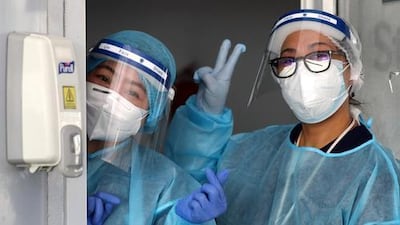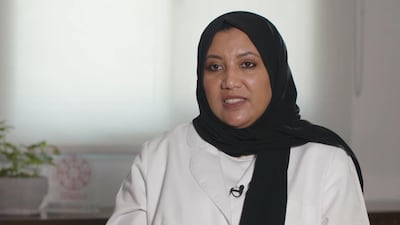Frontline workers in the UAE have told of how they emotionally prepared themselves to face unknown challenges posed by a new, highly contagious and fatal coronavirus in January.
Police officers, healthcare professionals and other government workers were immediately called to action to respond to a rapidly changing global situation as the pandemic emerged.
Eight months on, some have spoken about the effect Covid-19 had on their lives and how they coped with the fear during an uncertain future.
In February, days after the UAE announced its first cases, Matar Al Nuaimi, director of the emergency and disaster management division, called an emergency meeting with senior staff from Abu Dhabi Police’s medical services department and laid bare the reality of the difficulties ahead.
Mr Al Nuaimi, also a director of public health in Abu Dhabi, told staff the outbreak in China meant the world would soon be facing an unprecedented challenge.
Clinical scientist Col Thuraya Ali Al Hashemi, director of the medical services department, and her team were asked to lead the fight against Covid-19 across all the departments and facilities of Abu Dhabi Police, including in prisons and correctional establishments.
“That meeting was on a Thursday at noon and we had to devise a plan that would start on Sunday,” she said.
“When I drove back home that night I felt stressed and had to develop a comprehensive plan and strategy that covered team members’ training, resources and equipment.
“My team showed real dedication by working immediately on the issue.
“They started to implement the strategy in all sectors to protect every employee and the community at large.”
The operation included opening three clinics in Al Ain, Al Dhafra, Abu Dhabi, and seven specialist teams in the Punitive and Correctional Establishment.
They were also asked to source testing devices and equip staff with adequate Personal Protective Equipment to ensure those on the front line were kept as safe as possible as infections began to rise.
One morning in April, Col Al Hashemi began to feel unwell.
“On April 2. I began to feel fatigued, then the day after I lost my sense of taste and smell,” she said.
“I also had a headache that lasted for about five days. It was then that I tested positive for the coronavirus so I went into hospital for a week and then quarantined for 14 days.”
Despite her illness, Col Al Hashemi continued to work while isolated in a temporary office in a hospital room.
After she recovered, and completed her quarantine period, she was back on the ground to serve her country.
But she pushed herself too far. Her relentless work led her to faint from exhaustion two weeks after completing quarantine. She fell in an office stairwell and injured her wrist.
“My management urged me to take a few days off, but I couldn’t,” said Col Al Hashemi.
“It was my duty to carry on.
“The pain was getting worse by the day. After three weeks I went to a doctor who sent me for an X-ray and confirmed it was a bone fissure.
“She said I had to wear a splint, but I went back to work straight away.”
____________________
Frontline heroes project - in pictures
____________________
As more new cases were reported, Abu Dhabi Police established a chronic disease team, post-quarantine clinic and mental heath support unit for employees.
“I was proud carrying out my responsibilities like everyone else in my team,” she said.
“I wanted to stay on the front line. Everybody was doing their part, day and night, and I was proud to work with the medical staff I met during this challenge – they demonstrated extraordinary efforts.”
Col Al Hashemi was not the only frontline worker to contract the virus while on duty.
Dr Ajit Kanbur, department head of obstetrics and gynaecology at NMC Royal Hospital in Dubai, had Covid-19 diagnosed on September 14.
“I had severe covid pneumonia and was first admitted to NMC Hospital, then the command hospital at Thumbay and finally Rashid Hospital,” said Dr Kanbur, 56.
He remained in hospital until October 2 and is now slowly recovering while quarantining at home.
“It takes a little more time to breathe and speak but the lung exercises are helping,” he said.
Without the infusion of convalescent plasma loaded with antibodies donated from recovered patients, Dr Kanbur said he may have succumbed to the virus.

“As a doctor, we knew how important the precautions were back in February, but we did not know how the virus would progress over time.
“That is why there was so much fear and nervousness around what was happening.
“I was lucky to have the infection so late as all the doctors realised what effective protocols and medicines worked.
“The plasma saved my life. If I had the infection in February or March there was none available, so my situation would have been much worse then.”
He said he followed safety protocols to a tee but contracting the virus is a risk all frontline workers face.
“We all know there are three cardinal rules to follow; face mask, hand hygiene and social distancing.
“Like many of my colleagues, I had been following these rules but still caught the virus. I was just unlucky.”
In July, a Frontline Heroes Office was established to create a comprehensive national database of more than 80,000 frontline professionals and volunteers involved in the UAE's fight against Covid-19.
The new registry provides a detailed national picture of all those who served on the front line to recognise their commitment to public service and support their ongoing wellbeing.
The FHO is a permanent federal entity mandated to ensure that UAE maintains a strong and comprehensive network of frontline professionals capable of responding to any future crisis.
“We must always be prepared to immediately and effectively respond to any crisis or emergency we face today and anytime in the future for the protection of our people and our society,” said Dr Maha Barakat, director general of the FHO.
“To help our nation maintain a frontline workforce ready and able to take on the sacrifices and risks we ask, we owe it to them to ensure they are appropriately recognised and supported by our government and our people.
“Our first task has been to directly engage with and listen to our frontline heroes to truly understand what matters most to them.”














![Left to right: Soyab Bhasea, from India and Mohammad Zayed, from Pakistan, are delivery drivers for a distribution company, delivering goods to supermarkets and warehouses. Mohammad says: "I have to continue my work in these times. Allah hafiz [God will protect us]." Reem Mohammed / The National](https://www.thenationalnews.com/resizer/v2/3X2UBNHT2NJBRRDHJ5PPE3PSIY.jpg?smart=true&auth=ffc49d156cad8106942c4920e428dbe68e5100c1a24982fdbee1972a2895195e&width=400&height=225)





